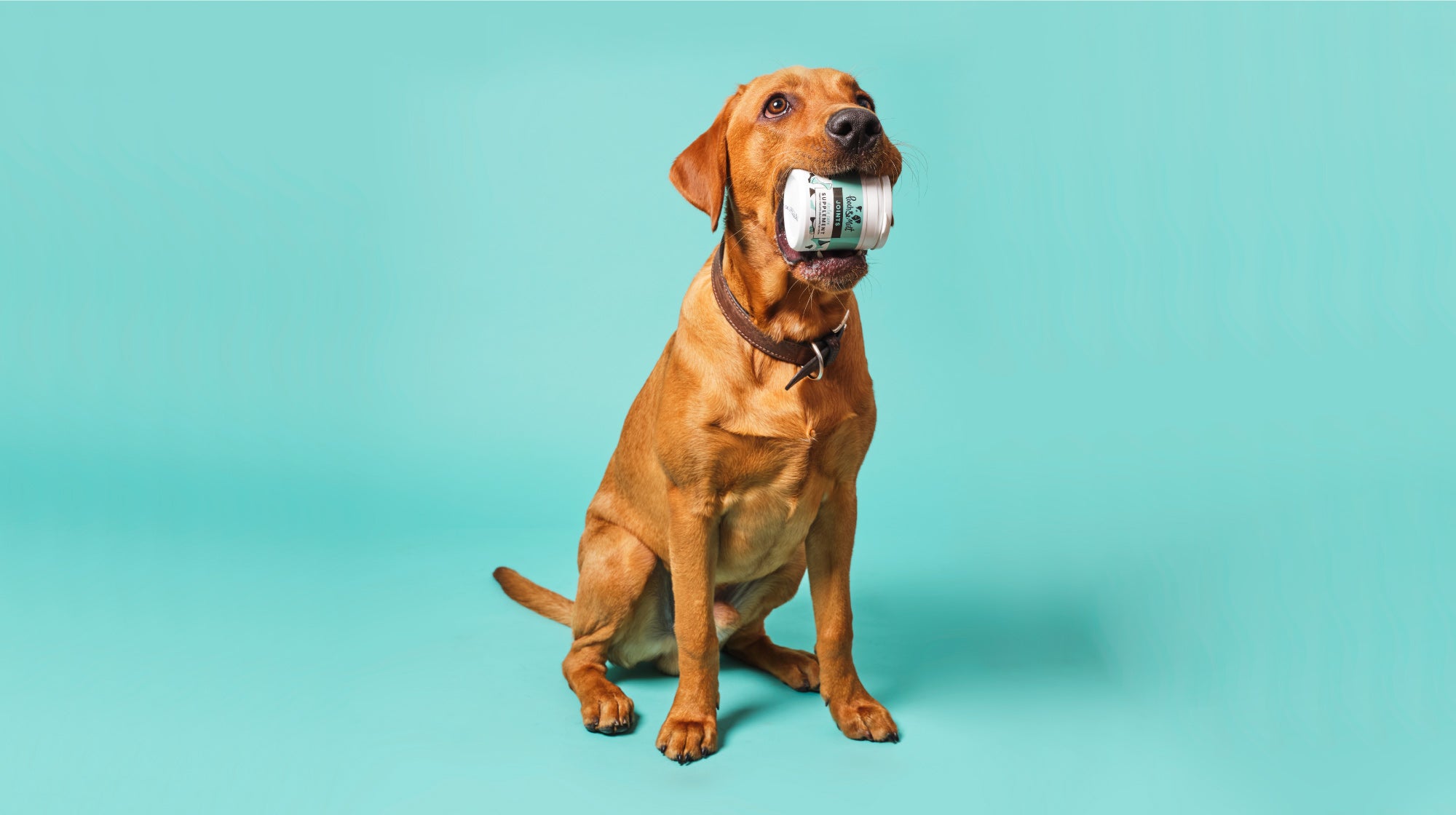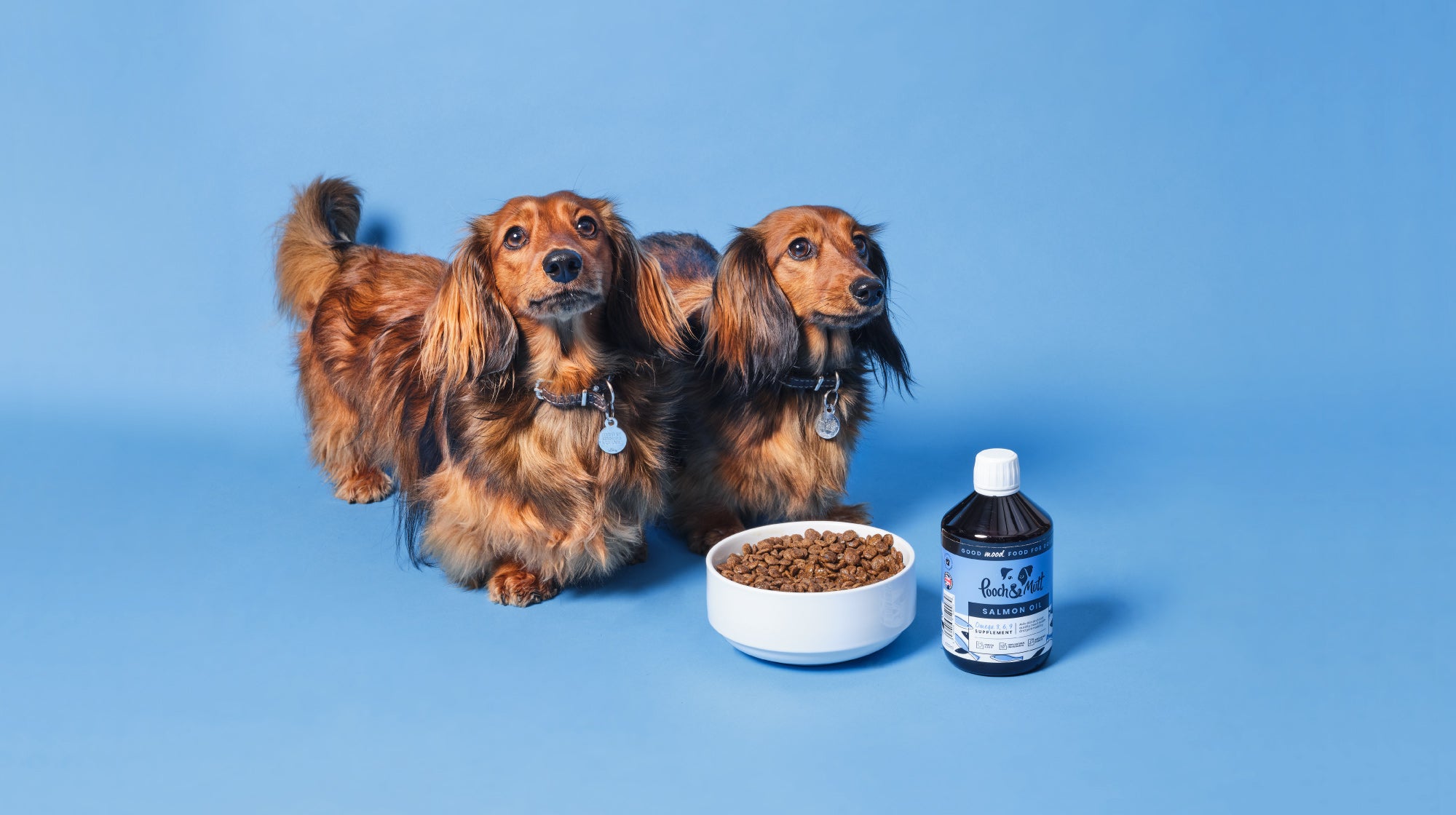
FREE UK DELIVERY ON ORDERS OVER £39.99
At Pooch & Mutt we’re huge advocates for dog nutrition as a form of medicine. There are many easy ways to get your beloved pooch the right nutrients, vitamins and minerals they need for a healthy, tail-wagging body and clear, happy mind.
However, it can be hard to know where to start when it comes to healthy food for dogs, especially when it comes to all the different terminology and understanding what does what.
Let us pull back the curtain on doggy diet and nutrition. This full lowdown will have you clued up on the nutrients, vitamins and minerals dogs need, and offers easy tips on getting the goods into their meals.

Dogs and humans have different digestive systems, but it’s fair to say we both suffer when our meals are repetitive, bland and boring. If you want a happy dog with a strong and healthy body both inside and out, the first step is to ensure a varied and balanced diet with plenty of tasty, natural ingredients (1).
To start with, a dog’s diet should be made up of the following food groups:
Protein-rich foods such as meat, fish or poultry are super important for bodily function in dogs, as protein contains amino acids that produce energy and form the building blocks of skin, nails, muscles and bones.
Carbs are mainly used as a source of energy. They aren’t essential in a dog’s diet, but they are useful for the absorption of vitamins and minerals. Potatoes, for example, are a great carb for dogs.
Getting the right amount of the right fats and fatty acids is vital for a dog’s health. Omega-rich fats such as salmon oil ensure a healthy nervous system, protected internal organs and a comfortable coat and skin.
Your dog is about 70% water - and needs topping up regularly! Water regulates body temperature, flushes waste, transports nutrients to cells and digests food - to name but a few of its vital functions.
Responsible for performing hundreds of doggy health tricks, from metabolising and immunity-building to cell production; vitamins and minerals are essential to a happy, well-functioning dog.

We know there’s a lot to get your head around with vitamins and minerals for dogs, so here’s a simple explanation of the benefits of each…
Often found in eyecare supplements, vitamin A is great for eyesight, growth, foetal development, cell function and immunity.
B vitamins are generally responsible for internal functions such as energy regulation, enzyme function and metabolism. B-6 is especially important as it’s vital for a variety of cell, hormone and immunity processes.
An important antioxidant which reduces inflammation and slows cognitive ageing. Dogs produce vitamin C on their own, but sometimes a supplement can add an extra boost.
Vital for bone production and muscle health, vitamin D is known as the ‘sunshine vitamin’.
Defends against cell degeneration in dogs, especially in the eyes and muscles, and helps with reproductive issues.
Ensures your dog’s blood is able to clot.
Often used for dogs with epilepsy, choline ensures healthy brain and liver function.
Now the minerals! Minerals are split into macrominerals, which your dog requires in large quantities, and microminerals, which they require in trace quantities.
These two minerals work together in your dog’s body to build healthy bones and teeth. Among other functions, calcium also promotes a healthy nervous system.
The three main electrolytes in your dog’s body, which play a crucial role in fluid balance.
A multi-faceted mineral, magnesium plays an important role in building bones, enzymes and intracellular fluids.
Helps reduce skin irritation in dogs such as itchy, flaky or greasy skin.
Though a micromineral, iron is one of the ‘big dogs’ when it comes to minerals, performing a huge number of functions - not least, carrying haemoglobin and oxygen around your pooch’s body and strengthening their immune system.
Copper helps absorb iron into your dog’s body, and also helps to form skin, fur and connective tissue.
Among other functions, zinc plays an important role in immunity - a deficiency can mean your dog isn’t protected from infection.
Iodine helps with your dog’s metabolism and thyroid hormone production.
Chromium helps with the uptake of glucose. Diabetic dogs are more in need of this mineral in order to feel the effects of insulin.
Lots of functions come from manganese - it metabolises protein and carbohydrates into fatty acids, helps maintain dogs’ bones and joint cartilage, and produces energy.
Selenium is an important mineral for its antioxidant qualities and for balancing your dog’s metabolism.
So now that you know what each food group, vitamin and mineral does for your dog’s health, what should you look out for on a dog food label?
Avoid:
X Phrases such as ‘Beef flavour’ or ‘Using animal derivatives’. This usually means the food includes the likes of hooves, entrails, feathers and beaks rather than actual muscle meat, and it may upset a dog’s stomach. Aim to feed your dog the highest quality protein sources whenever possible.
X Mentions of sugar, grains or animal fats. These are usually used as filler, and the lack of specificity makes it hard to identify the ingredients, should your dog have a bad reaction (3).
X ‘Artificial colours and flavours’ are also highly unnecessary, potentially dangerous and add no nutritional value for your dog. We’re sure you’ll agree, your pooch deserves better than false additives.
Enjoy:
✔ All natural ingredients, clearly labelled. You should be able to understand everything that’s listed on a label - that’s whole meat, fish or poultry, fruit and veggies, vitamins and minerals - with no E numbers, fillers or vague ‘catch-all’ references.
✔ Grain-free Lots of dog foods contain grains, but at Pooch & Mutt, all of our wet and dry dog food is grain-free. This is because plenty of dogs are intolerant to grains such as wheat - and it’s often used as a filler ingredient in mass-produced dog foods.
✔ Important to note: a healthier food for dogs will be more calorific per gram than other dog foods.
Squeezing the right amount of nutrition into your dog’s diet can be easy, or trickier, depending on whether you feed them commercial dog food or homemade food.
As mentioned, all commercially available dog food in the UK should legally be vet-approved, and so long as they’re labelled ‘complete and balanced’, they’ll meet the minimum requirements for dog nutrition.
To do more than the minimum, though, choose pet food brands that pride themselves on using simple, high-quality ingredients; thoughtfully put together with your dog’s physical and mental wellbeing in mind.
Making your dog meals from scratch has been found to be a riskier option, as your pooch may not receive everything they need to be healthy (4). Daily cooked chicken, for instance, means they will miss out on a lot of essential nutrients. If your dog likes the taste of various meats, fish, fruit and veggies, you could be onto a winner - but you will need to use supplements to balance out any deficiencies.
If your dog has specific health needs, or if they’re a puppy - they may benefit from taking supplements alongside their regular dog food. There are specific health foods for puppies, for instance; dogs with stiff joints or mobility issues could benefit from a joint care supplement; or those with sensitive tummies could take a digestion supplement for dogs.
Dog supplements can be easily sneaked into your pooch’s food as they taste delicious and come in easily digestible powder, tablet or oil formats - but it’s important to consider the following before stocking up:
1. Research which supplements your pooch might need based on their health, age and breed - and where they might need a boost, considering their diet.
2. Avoid choosing any/all supplements in the misguided belief that ‘anything will help’. Feeding your dog vitamins and minerals they don’t need can be harmful to them - so be sure to follow recommended dosage guidelines.
3. Check with your vet before you feed your dog supplements, as they can offer informed guidance based on your pooch’s unique needs.
If you have more questions about feeding your dog a well-rounded, balanced and nutritious diet, feel free to get in touch with us. To get started with delicious, all-natural health food for dogs, check out our range at Pooch & Mutt.
References
Never miss a treat!
Subscribe to our newsletter and get blog articles amongst other treats delivered to your inbox

Comments (1)
Hi i have a Staffy/Labrador cross 11yrs he seems to be stiff in his left rear hip when getting up and would like to find a suitable vitamin/mineral to help him thank you
Leave a comment